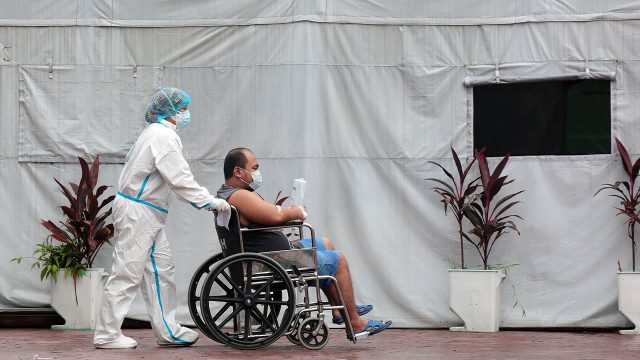Exodus of nurses continues in virus-stricken Philippines

VINCENT GIAN N. SALAZAR, 26, fulfilled his lifelong dream by moving to the US as a healthcare practitioner in 2021, when the Philippines was reeling from the sting of a global coronavirus pandemic.
The California-based Filipino now earns 10 times what he used to get as a medical technologist at a hospital in the Philippine capital.
“I continued my medical profession in another country to advance my career, which is difficult to do in our country,” he said in a Facebook Messenger chat.
 The pandemic that has killed more than 60,000 Filipinos and 6.4 million people worldwide has tested the limits of Filipino health workers toiling at local hospitals. Many of them have since left the country to pursue greener pastures overseas.
The pandemic that has killed more than 60,000 Filipinos and 6.4 million people worldwide has tested the limits of Filipino health workers toiling at local hospitals. Many of them have since left the country to pursue greener pastures overseas.
Some nurses in private hospitals in the provinces get as low as about P5,000 a month, said Robert Mendoza, president of the Alliance of Healthcare Workers.
In 2020, the Philippine government raised the starting salary of nurses in state-owned hospitals to about P32,000 ($582) from P22,000. But some of the higher-ranking nurses got demoted and had to settle for their old rates.
Cristy V. Donguines is one of the country’s health workers who had been through the worst of the pandemic.
For many months, she depended on the goodwill of their village patrol that took her to a meeting place in Bulacan province northwest of Manila so she could share a ride with a co-worker for a nearly two-hour journey to reach Jose Reyes Memorial Medical Center in downtown Manila.
“If the government can afford to double the salary of policemen, it should also be able to do the same for frontline health workers,” she said by telephone.
Local health workers had to sacrifice a lot especially every time a surge in coronavirus infections took place, many of them having to isolate themselves after being exposed to the virus. Transmitting the virus to their loved ones was a constant fear.
“More importantly, at the height of the pandemic, they had to accept greater risk of being sick or even death, with very minimal increase in compensation,” Domini S. Velasquez, chief economist at China Banking Corp., said in an e-mail.
The Health department has said it was looking at paying health workers and their families more than P300 million in sickness and death compensation claims.
Mr. Mendoza noted how healthcare workers had to deal with the lack of transportation, accommodation and inadequate hazard pay during the pandemic.
Meanwhile, demand for their kind has increased in developed nations that have opened up opportunities for employment. This includes countries with advanced healthcare industries such as the US, UK, Germany and Japan.
“As this exodus continues, the Philippines is at the losing end because our investments in their human resource development is benefiting other economies,” John Paolo R. Rivera, an economist at the Asian Institute of Management said in a Viber message.
“The producer of healthcare professionals is the one experiencing the constraint when we should have the bargaining power.”
‘FORCED TO LEAVE’
Some Filipino doctors might also opt to work as nurses overseas just to be able to leave the country, Ms. Velasquez said.
Faustino Jerome G. Babate, executive director at the Filipino Nursing Diaspora Network, said some of these workers, especially nurses deployed to the Middle East, have had to deal with recruitment issues including salaries below contract.
“Recruiting countries should commit financially to the Philippines to support the development of the local health system, including the improvement of working conditions and personnel management,” he said in a LinkedIn message.
Health workers make up a significant part of the Filipino diaspora that sends money to their families back home. These inflows fuel household spending, which accounts for about three-fourths of the Philippine economy.
Cash remittances sent home by Filipinos overseas hit a record $31.42 billion in 2021, a 5.1% yearly growth, according to the central bank.
The US, where many Filipinos work in healthcare, has always been the biggest source of inflows.
One of seven Filipinos was looking to emigrate in the next five years, according to a 2018 survey by the local statistics agency.
“Health workers would be willing to stay here to be with their families if only they are valued as much as in other countries,” Mr. Rivera said. “This is a battle of where they are valued most.”
Ms. Velasquez said newly installed President Ferdinand R. Marcos, Jr.’s proposal to end contractualization, though lacking in details, could encourage more health workers to stay. His predecessor, Rodrigo R. Duterte had promised the same but this did not materialize.
“Any improvements in domestic conditions should not prevent any Filipino from leaving the country if they choose to,” she said. “But voluntarily choosing to leave should be distinguished from being forced to leave because of economic circumstances at home.”
Mr. Salazar, the medical technologist, is set to eventually become a naturalized American citizen and is trying to build his career there.
“I would like to go back to my home country every now and then not to work anymore, but to give back to the community,” he said.
On the other hand Ms. Donguines said the pandemic had made her realize that life is short and she would rather spend it near her loved ones.
About a fourth of nurses at the hospital she works in have left for overseas work since coronavius infections eased, she said.
“The younger ones are leaving,” she said. “What will happen to Filipinos with already poor healthcare services if older people like me leave as well?” — LWTN
